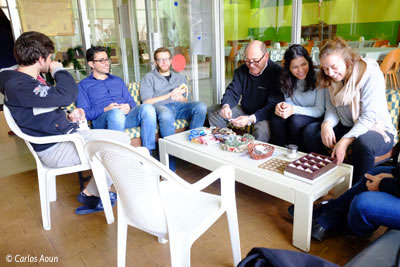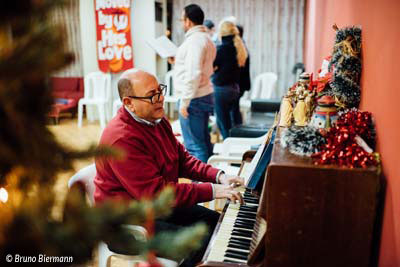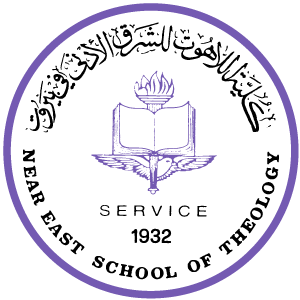- Library
- |
- CES
- |
- Make a Gift
- |
- Contact us
- |
- Webmail
- About NEST
- |
- Admission
- |
-
Academic Programs
- Introduction
- General Requirements
- Bachelor of Theology (B.TH.)
- Bachelor of Theology (Minor: Christian Education)
- Bachelor of Arts in Christian Education (B.A.C.E.)
- Master of Divinity (M.DIV)
- Master of Arts in Christian Eucation (M.A.C.E.)
- Diploma in Theological Studies
- Master of Sacred Theology (S.T.M.)
- Studies in the Middle East Program
- Sabbatical for Pastors
- Course Offerings
- |
- News & Events
- |
- Resource Center
- |
- Publications
Seminary Life
Location & Physical Plant
The Near East School of Theology is located near the western tip of Beirut, only a short distance from the Mediterranean Sea. It is in convenient proximity to other educational institutions, such as the American University of Beirut, the Lebanese American University, and Haigazian University, all of whose study resources are available to the N.E.S.T. students through cross-registration arrangements.
All residential and educational facilities of the School are housed within a single building.
On the ground floor are the administrative offices, classrooms and the “large” and “small” chapels.
The first floor has the library, faculty offices, and a conference room.
On the second are the kitchen and the dining room, which can accommodate more than 100 people, the student lounge and two spacious terraces.
The third and the fourth floors comprise the dormitory which can accommodate up to 50 persons, and the fifth floor is designed for faculty housing.
Underground, there is a large garage, ample storage spaces, an auditorium, a gymnasium and a shelter.
Room & Boarding Services

The residential section contains units of one single and one double bedroom with toilet, shower and two balconies. The rooms are equipped with bed and mattress, wardrobe, desk, chair and bookshelf for each occupant. Students are expected to bring their own bedding but those coming from remote areas may be given bedding from the School at a nominal cost. One wing of the dormitory is reserved for women students. Some rooms are always kept available for short-term guests.
The School kitchen serves three daily meals to all residents throughout the academic year, with the exception of the Christmas and Easter holidays and the month of August. Food services are also available for outside groups and individuals by special arrangement with the Business Office. The dining hall is closed during the summer break. A coffee shop, managed by the students, is available at designated hours.
All material arrangements for housing and food services, as well as supervision of the building and kitchen staff, are the responsibility of the Business Office which is also available to assist students in practical and financial matters.
Dormitory life and social activities are under the supervision of the Head Resident who acts for the Administration in these matters. Annually, the student body gathers to elect officers and to set up committees for extra-curricular activities, such as sports, social gatherings and Bible studies.
Spiritual Life

Under the direction of the Spiritual Life Committee, composed of faculty and students, plans are drawn up for the daily chapel services, which are led by faculty, senior students and guests. The Committee arranges for special services at appropriate times, such as Advent and Holy Week.
The Committee, in consultation with the whole Faculty, is also in charge of the retreats, when the entire student body and faculty meet together for a period of worship and meditation, at a location outside the School.
A student committee named by the student body arranges for a weekly Bible study and a weekly prayer service. On Sundays, students disperse to their own churches or to Field Work assignments, under the auspices of the School. Students from abroad, who do not speak Arabic or Armenian, will find in the vicinity of the School several small expatriate congregations with services in German, French or English.
The academic year begins with a service of Holy Communion, the Opening Convocation, and concludes with the Commencement Service.
All residential and educational facilities of the School are housed within a single building.
On the ground floor are the administrative offices, classrooms and the “large” and “small” chapels.
The first floor has the library, faculty offices, and a conference room.
On the second are the kitchen and the dining room, which can accommodate more than 100 people, the student lounge and two spacious terraces.
The third and the fourth floors comprise the dormitory which can accommodate up to 50 persons, and the fifth floor is designed for faculty housing.
Underground, there is a large garage, ample storage spaces, an auditorium, a gymnasium and a shelter.
Room & Boarding Services

The residential section contains units of one single and one double bedroom with toilet, shower and two balconies. The rooms are equipped with bed and mattress, wardrobe, desk, chair and bookshelf for each occupant. Students are expected to bring their own bedding but those coming from remote areas may be given bedding from the School at a nominal cost. One wing of the dormitory is reserved for women students. Some rooms are always kept available for short-term guests.
The School kitchen serves three daily meals to all residents throughout the academic year, with the exception of the Christmas and Easter holidays and the month of August. Food services are also available for outside groups and individuals by special arrangement with the Business Office. The dining hall is closed during the summer break. A coffee shop, managed by the students, is available at designated hours.
All material arrangements for housing and food services, as well as supervision of the building and kitchen staff, are the responsibility of the Business Office which is also available to assist students in practical and financial matters.
Dormitory life and social activities are under the supervision of the Head Resident who acts for the Administration in these matters. Annually, the student body gathers to elect officers and to set up committees for extra-curricular activities, such as sports, social gatherings and Bible studies.
Spiritual Life

Under the direction of the Spiritual Life Committee, composed of faculty and students, plans are drawn up for the daily chapel services, which are led by faculty, senior students and guests. The Committee arranges for special services at appropriate times, such as Advent and Holy Week.
The Committee, in consultation with the whole Faculty, is also in charge of the retreats, when the entire student body and faculty meet together for a period of worship and meditation, at a location outside the School.
A student committee named by the student body arranges for a weekly Bible study and a weekly prayer service. On Sundays, students disperse to their own churches or to Field Work assignments, under the auspices of the School. Students from abroad, who do not speak Arabic or Armenian, will find in the vicinity of the School several small expatriate congregations with services in German, French or English.
The academic year begins with a service of Holy Communion, the Opening Convocation, and concludes with the Commencement Service.
©Copyright 2026 | All Rights Reserved | Photography ©Bruno Biermann, ©Carlos Aoun.
Powered by Digital ITS

